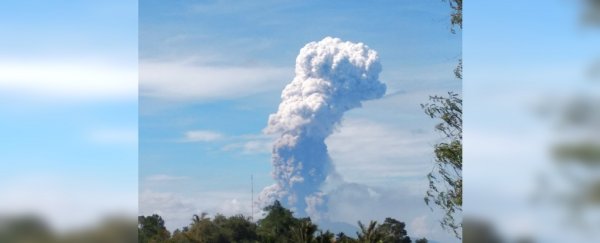Only days after a devastating earthquake and tsunami struck the Indonesian island of Sulawesi – killing at least 1,347 people – survivors now have another powerful force of nature to reckon with.
Months of increased activity at the Mount Soputan volcano on Sulawesi culminated in an eruption this morning, producing an ash column estimated to extend as high as 4,000 metres (over 13,000 ft) into the sky.
Officials at the Ministry of Energy and Mineral Resources immediately issued a Volcano Observatory Notice for Aviation (VONA) updating the aviation colour code to Orange, having raised it to Yellow (from Unassigned) only hours before.
A volcano has just erupted on Indonesia's Sulawesi, just days after an earthquake and tsunami devastated areas on the western side of the island.
— Karlis Salna (@KarlisSalna) October 3, 2018
Mount Soputan, in North Sulawesi erupted about an hour ago. pic.twitter.com/O8jQMkHBoP
Prior to the eruption, authorities at MAGMA Indonesia (Multiplatform Application for Geohazard Mitigation and Assessment) issued a statement explaining that both thermal and seismic activity at the volcano had increased in recent weeks.
Readings from a thermal camera indicated the presence of high temperature lava near the top of Soputan, and seismic activity had jumped from approximately two recorded seismic events per day during September to 101 recorded quakes on Tuesday.
The volcano erupted only hours after this statement was released, warning of the potential for eruption, and increasing the activity status of the volcano to Level III (Standby).
However, so far it's too early to say how significant or dangerous the eruption is going to be.
Terjadi erupsi G. Soputan, Sulawesi Utara dengan ketinggian kolom abu 3000-4000 meter, mengarah ke arah Barat-Barat Laut. Zona bahaya radius 4km, dan sektoral arah barar-barat daya 6.5km. pic.twitter.com/x4swF8pS7I
— MAGMA Indonesia (@id_magma) October 3, 2018
At present, the VONA indicates that eruption and ash emission is continuing, with the ash cloud moving in a north-westerly direction.
Authorities are warning people keep outside a general 4 km (2.5 miles) radius of the summit, and up to 6.5 kilometres (about 4 miles) away in the region to the immediate south-west of the volcano to avoid ash clouds and, potentially, lava flows.
Communities living around Soputan and anyone in the immediate vicinity are advised to use face masks to cover their nose and mouth, to mitigate respiratory problems in the event of ash clouds.
We won't know how serious the danger is of this eruption until authorities and volcanologists have more of a chance to assess the situation, but for now officials are taking no chances.
And to those wondering whether the recent devastating earthquake and this volcano eruption were related, the simple is answer is that we can't really know for sure.
"The ability of earthquakes to trigger volcanic eruptions is still heavily debated, and at present, there's not enough convincing evidence to link the two," journalist and volcanology expert Robin George Andrews explains over at Forbes.
"You can't just link the two because they happened, or are happening, contemporaneously."
